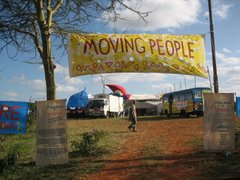Social networking sites and the web 2.0 are growing massively. Several projects, from Facebook to MySpace are drawing more and more people in. I just recently signed up for facebook myself, to become a member of a network that was set up in there as an organzing tool for a real life network at Uni. But will we really use it, I am not sure. Despite their popularity no one really seem to be quite sure yet, whether facebook and myspace will transform social organization or honestly are just a huge waste of time.
This is totally different, from my perspective, in a specific set of servises, in which the rationale for networking is to allow the members to benefit from mutual hospitality across a web-based global community. It is highly intresting to assess Web 2.0 relevance to travel.
Signing up in Couch-Surfing or Hospitality Club, the two main providers in this field will avail you with 1000s of open invitations to stay as people’s guests, free of charge, on a couch or sofa, in a guest room or at least camp in the garden. I became acquainted with the systems last year and used it extensively recently on a trip through California. I have to say, I am a fan!
I met very friendly people in San Franzisko, Santa Barbara and in LA, they not only took me in but also showed me around, offering their insights into the local restaurant szene and bars as much as their lives.
Looking at it with a bit more perspective it quickly becomes obvious how intresting the issues is for travel and tourism studies. Hospitality Club (HC) is the older version, dating back to 2000 and has by now over 300.000 members in all continenets. Couch-Surfing (CS) started bit later, but quickly grew to over 250.000 today. These numbers don’t seem significant when compared to general tourism statistics. Yet there groth rates are amazing and there is not an end in sight. How does it function?
I entered HC first, last summer and then tried in on a short trip to Bratislava. I contacted a few people as offered in the list and got feedback from one member. She said her housemate wouldn't want to allow her to have people stay this time, but she was willing to show me around in Bratislava. Happily I accepted and we met and she showed me around, giving me insights into the town and her take on the cities situation that I would have missed without HC.
What makes the voluntary exchange intresting to tourism studies is the challenge is poses to the hospitality industry. As one user puts it: “"Who wants to sit in a lonely hotel?" Staying in annoynous and expensive housing is not necessarily convinient. Moreover it seems that despite calls for "post-tourism" and its claim that all tourists today relate with some ironic distance to the world of travel, HC and CS show that people still invest heavily into the idea of authentic travel experience and are actively looking for alternatives to commodified tourist scapes.
Moreover the extensive community and networking functions that the web provided are themselves restructuring the social realities of travel. Communities from in these sites are not remaining virutal, but realized themselves in festivals and camping events, organized in several places and of different geographical scope. A CS member from Leeds recently invited me to a Leeds members meeting in Hydepark in my neighborhood. And so through the help of a global networking page I might end up making friends just blocks away from my house.
Research should be undertaken into these sites and their communities as they are actively transforming the way travel works. I will keep my eyes open and hope that I see you soon on HC and CS.
Thursday, 26 July 2007
The world is smaller than you think!
Labels:
Authenticity,
Exchange,
Hospitality,
Meaningful Travel,
N.E.T.,
travel industry
Subscribe to:
Post Comments (Atom)

No comments:
Post a Comment